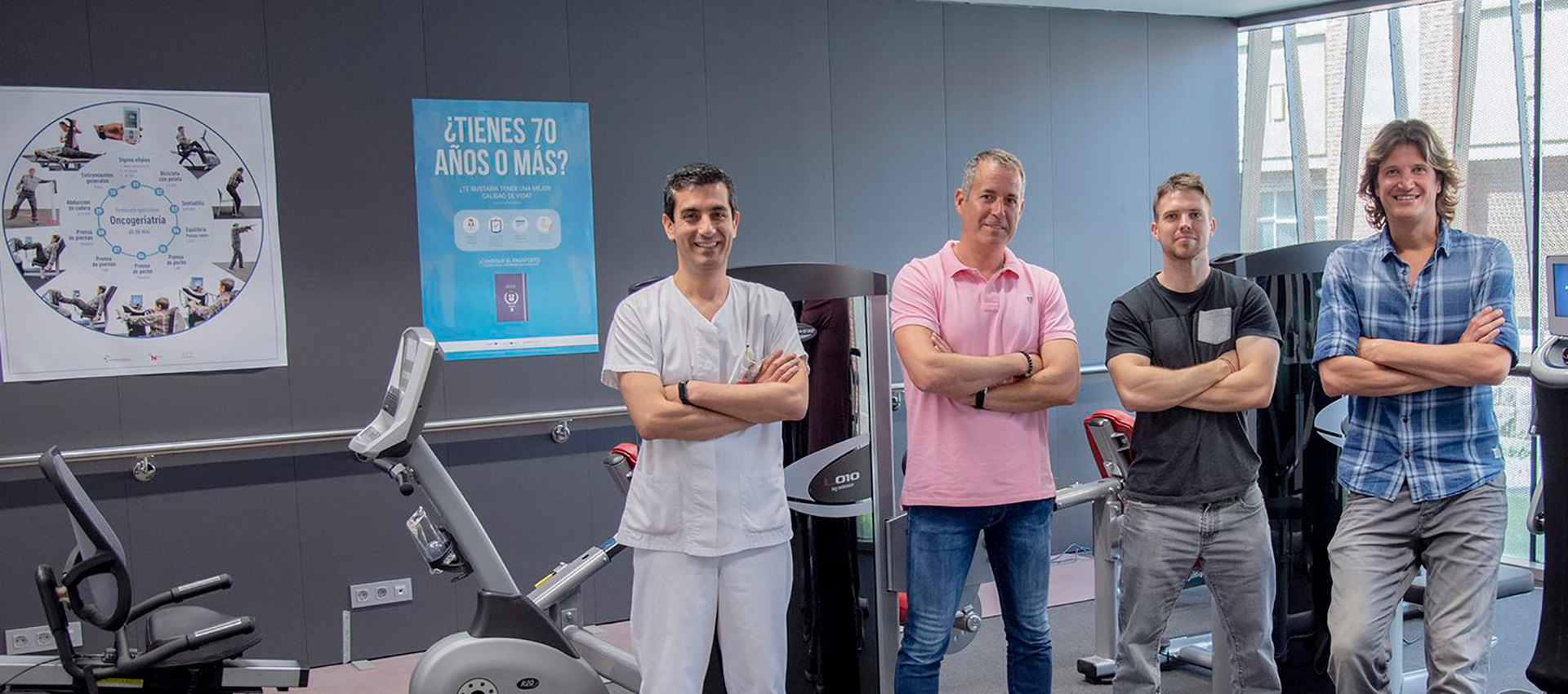
An accurate physical exercise program reverses functional decline in hospitalized patients over the age of 75
This is demonstrated in the research coordinated by UPNA and Navarrabiomed researchers Mikel Izquierdo Redín and Nicolás Martínez-Velilla.
A study conducted by researchers from the UPNA, of Hospital Universitario de Navarra and from the Navarrabiomed centre, concludes that “an individualized physical exercise program, performed for as little as 3 days, attenuates the disability associated with hospitalization in people over 75 years of age”. Research has been coordinated by Nicolás Martínez-Velilla and Mikel Izquierdo, researchers from Navarrabiomed — the biomedical research centre of the Government of Navarra and the Public University of Navarra - and the results have just been published in “Journal of the American Medical Association”.
Older adults are particularly prone to the risks of hospitalization, including the high risk of functional and cognitive impairment. One year after discharge, more than half of hospitalized geriatric patients do not regain their pre-admission functional levels, which is associated with an increased risk of admission to a nursing home and death.
This study verifies previous results, which showed that a multicomponent physical exercise program, during a period of hospital admission, can be very effective in this type of patients to avoid the decrease in the ability to perform activities of daily living. Other aspects such as cognitive status and quality of life also improved.
According to the authors, these results open up the possibility that medical hospitalization units can change their traditional paradigm, usually focused on the disease, to another that recognizes the functional state of the person as a clinical sign that may be adversely affected by traditional hospitalization (classically based on bed rest).
The authors of the work are Mikel Izquierdo and Mikel López Sáez de Asteasu, from the Department of Health Sciences of the UPNA; Fabricio Zambóm-Ferraresi, researcher of Navarrabiomed together with Nicolás Martínez-Velilla, who is also head of the Geriatrics Service of the University Hospital of Navarra; Pedro Abizanda, head of the Geriatrics Service of the University Complex of Albacete; Javier Gómez-Pavón, head of the Geriatrics Service of the Hospital of the Red Cross, San José and Santa Adela in Madrid; and Maria Fiatarone-Singh, from the Faculty of Health Sciences, University of Sydney, Australia.
This research has received funding from the Government of Navarra, the Government of Spain, the European Union, the “la Caixa” Foundation and the Caja Navarra Foundation.
Precision physical exercise
The participants in this research performed, during a period of 3 days of hospitalization, a controlled and individualized program of strength, balance and gait exercises adapted to their possibilities, even during the acute phase of their diseases. Depending on the condition of each participant, a training intensity of between 30% and 60% of their muscle capacity was determined, with which they performed leg and arm exercises. These sessions lasted twenty minutes, in two daily visits (morning and afternoon), for between five and seven consecutive days (including weekends and holidays), under the individualized supervision of experts in the field of physical exercise in older people.
The physical activity program was adapted from the VIVIfrail training program, already successfully tested in almost a thousand people with frailty problems and residents of seven European countries. In this study, it was always adapted to the clinical circumstances of each patient and “far from generating complications in their initial state of health, it proved to be an important support for the prevention of frailty, an elimination factor for complications linked to passive stays in hospital and a way of motivation to overcome the disease”, as explained by the researchers Nicolás Martínez-Velilla and Mikel Izquierdo.
"Our study — explains Professor Mikel Izquierdo - shows that an innovative and individualized multicomponent physical exercise intervention, which includes moderate intensity resistance training for a very short period (three days on average), is feasible and attenuates the disability associated with hospitalization. This extends the findings of previous studies in which an acute decline in activities of daily living was prevented in a similar group of hospitalized older adults.”
The researchers conclude that the improvement of daily living activities in elderly or frail patients requires a more intensive approach than simply promoting mobility or getting out of bed, and that both the number of days of implementation of this program and the moderate intensity of exercises are important factors when optimizing the benefits in hospitalized older adults.
"Sometimes — they point out-, we believe that the improved technologies or the latest innovative treatment can provide all the solutions to our problems, but we are not aware that the disability generated by hospitalization can have a greater impact than the illness itself that caused the admission”. In this regard, they reiterate the very positive effect that physical exercise can have on the prevention and treatment of diseases.

